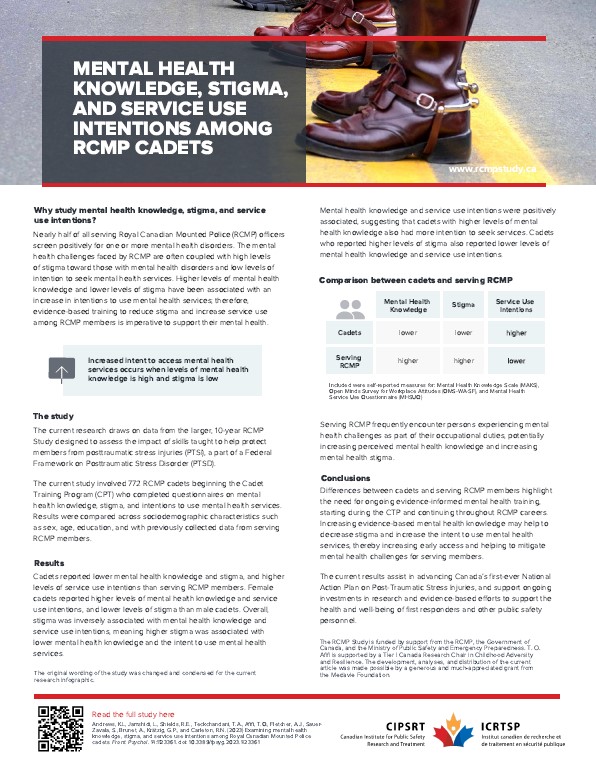Research Summaries
Why was the study done?
Royal Canadian Mounted Police (RCMP) officers report frequent exposures to several potentially psychologically traumatic events (PPTE), which are associated with the development of diverse mental health injuries. Nearly half of all serving RCMP officers screen positively for one or more mental health disorders. The high prevalence of mental health disorder symptoms reported by serving RCMP is coupled with high levels of stigma and low levels of intention to seek mental health services, further exacerbating mental health challenges.
Little is known about the levels of mental health knowledge, stigma, and service use intentions in RCMP cadets starting the Cadet Training Program (CPT). The current study is designed to 1) obtain baseline levels of mental health knowledge, stigma, and service use intentions of RCMP cadets; 2) determine the relationship between mental health knowledge, stigma, and service use intentions among RCMP cadets; 3) examine differences across sociodemographic groups; and 4) compare cadets to a sample of previously surveyed serving RCMP.
What was done in the study?
The current research is part of a larger RCMP Study, designed to assess the impact of skills taught to help protect members from posttraumatic stress injuries (PTSI). A research summary of the previously published RCMP Study Protocol can be read here.
Participants were 772 RCMP cadets (72% male) beginning the CTP, who completed surveys assessing mental health knowledge, stigma, and service use intentions.
What did we find out?
Mental health knowledge and service use intentions were positively associated, suggesting that cadets with higher levels of mental health knowledge also had more intention to seek services. Cadets who reported higher levels of stigma also reported lower levels of mental health knowledge and service use intentions. The currents results highlight the importance of increasing mental health knowledge and service use intentions by reducing stigma around mental health disorders and seeking help.
As expected based on prior research, female cadets reported statistically significantly higher scores on mental health knowledge and service use, and lower scores on stigma, than male cadets. Stigma is a barrier to seeking mental health services, particularly among male officers who have reported a fear of being seen as unfit for duty. The current study results suggest male cadets may be less aware or able to recognize mental health difficulties, and less likely to seek support when experiencing mental health challenges.
Participating cadets reported statistically significantly lower levels of mental health knowledge, lower levels of stigma, and higher service use intentions than serving RCMP. The lower mental health knowledge and stigma observed among cadets relative to serving members may be related to experience. Police officers encounter persons experiencing mental health challenges as part of occupational duties, which may implicitly increase stigma and increase perceived mental health knowledge.
Where do we go from here?
The current results provide necessary baseline data on levels of mental health knowledge, stigma, and service use intentions among RCMP cadets, as well as highlighting differences across sociodemographic characteristics and differences between RCMP cadets and serving members.
The results indicate RCMP cadets starting the CTP report lower mental health knowledge and stigma, and higher mental health service use intentions than serving RCMP, suggesting that stigma may increase through occupational experience. Further research is needed to understand the associations between on-duty experience, dealing with people experiencing mental health challenges, perceived mental health knowledge based on experiences, and stigma.
Further research is needed to better understand differences in mental health knowledge, stigma, and service use intentions, and how sex and gender might influence mental health knowledge among serving RCMP.
Results also associated higher levels of mental health knowledge with lower stigma and higher intention to use professional mental health services. The results highlight the importance of evidence-based mental health training; however, further research is needed to determine whether mental health training is related to increased mental health knowledge, decreased stigma, increased service use intentions, and overall improved mental health.
The original wording of the study was changed and condensed for the current research summary.
Original study:
Andrews, K.L, Jamshidi, L., Shields, R.E., Teckchandani, T.A., Afifi, T.O., Fletcher, A.J., Sauer-Zavala, S., Brunet, A., Krätzig, G.P., and Carleton, R.N. (2023) Examining mental health knowledge, stigma, and service use intentions among Royal Canadian Mounted Police cadets. Front. Psychol. 14:1123361. doi: 10.3389/fpsyg.2023.1123361
Prepared by K.L. Andrews and R.E. Shields
